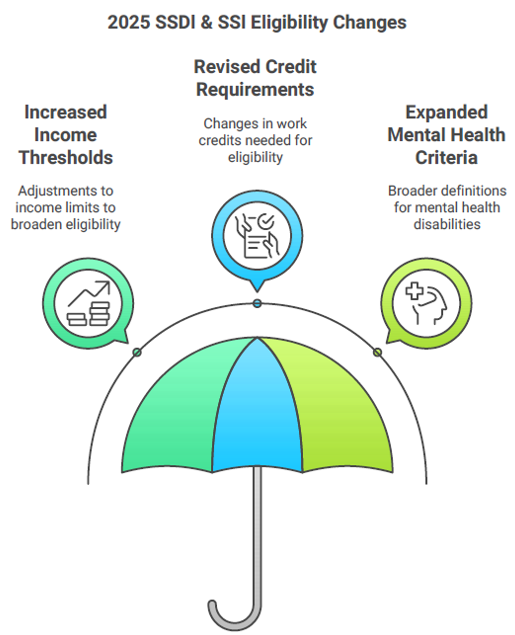This document outlines the significant changes to the eligibility criteria for Social Security Disability Insurance (SSDI) and Supplemental Security Income (SSI) set to take effect in 2025. These adjustments reflect an effort to accommodate economic shifts and enhance support for individuals with disabilities. Key updates include increased income thresholds, revised credit requirements, and expanded mental health criteria, all aimed at improving access to benefits while ensuring the integrity of the programs.

1. Substantial Gainful Activity (SGA) Limits
The SGA limits, which determine the income thresholds for SSDI eligibility, are increasing in
2025:
• For non-blind individuals: $1,530 per month (up from $1,470 in 2024)
• For blind individuals: $2,550 per month (up from $2,460 in 2024)
2. Social Security Credits
To earn one Social Security credit in 2025, individuals must earn $1,810, an increase from $1,730 in 2024. This change affects eligibility for both SSDI and retirement benefits, as typically 40 credits are required for benefit qualification.
3. Trial Work Period (TWP) Threshold
The monthly income threshold for a TWP month is expected to increase to around $1,100 in 2025, up from $1,050 in 2024. This adjustment allows SSDI recipients to test their ability to work without the immediate risk of losing their benefits.
4. SSI Resource Limits
While specific changes to SSI resource limits for 2025 have not been detailed, these limits are subject to periodic review and adjustment. They determine the maximum assets an individual or couple can own while still qualifying for SSI.
5. SSI Student Earned Income Exclusion
For SSI beneficiaries who are students under the age of 22, the amount of earnings that will not affect eligibility or benefits has increased to $9,460 a year in 2025. This change is designed to support young individuals pursuing education while managing their financial resources.
6. Mental Health Criteria
There is an ongoing initiative to expand and clarify mental health criteria for SSDI eligibility. This may potentially simplify the qualification process for individuals suffering from conditions such as chronic depression, anxiety, and PTSD. These changes are intended to adjust for economic factors and provide more flexibility for individuals with disabilities, while maintaining the integrity of the Social Security programs.

Leave A Comment
You must be logged in to post a comment.